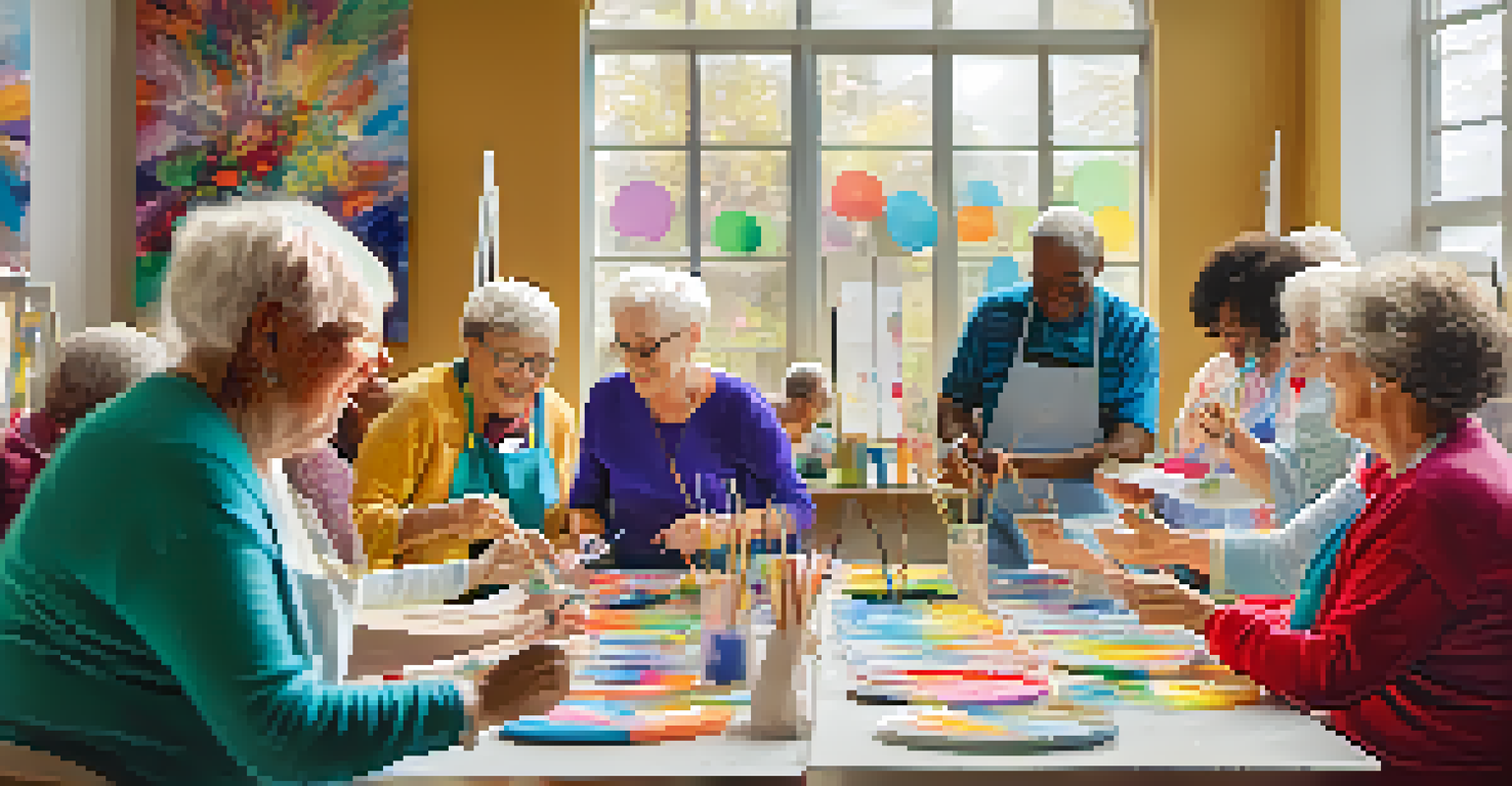The Role of Mental Health in Aging and Addiction Recovery

The Importance of Mental Health in Aging Populations
Mental health plays a crucial role in the overall well-being of aging individuals. As we grow older, we face various physical and emotional challenges, making mental resilience increasingly important. Maintaining a positive mental state can enhance quality of life and help seniors navigate the complexities of aging.
Mental health is not a destination, but a process. It's about how you drive, not where you're going.
Aging can bring feelings of loneliness and isolation, especially if loved ones are lost or mobility is limited. These feelings can spiral into anxiety or depression, which can significantly impact one’s health. Addressing mental health needs in the elderly is vital to prevent these issues from worsening.
Furthermore, mental health is interconnected with physical health. For instance, seniors struggling with mental health problems might neglect their physical health, leading to a cycle of decline. Thus, prioritizing mental well-being can foster better health outcomes across the board.
Understanding Addiction in Older Adults
Addiction is often perceived as a problem mainly among younger demographics, but it can significantly affect older adults as well. Many seniors may turn to substances like alcohol or prescription medications to cope with pain, loneliness, or depression. This can lead to a hidden epidemic of addiction that often goes unnoticed.

The reasons behind addiction can vary widely, from historical patterns of substance use to the stressors that come with aging. Moreover, older adults are often prescribed medications that can be addictive, increasing their risk for dependency. Recognizing these factors is crucial in addressing addiction in this demographic.
Mental Health is Vital for Seniors
Maintaining mental well-being is crucial for the overall health and quality of life in aging individuals.
In addition, social stigma surrounding addiction can deter older adults from seeking help. This isolation can exacerbate their mental health issues, creating a vicious cycle that is difficult to break. Thus, it’s essential to create supportive environments that encourage older individuals to seek assistance.
The Interplay Between Aging, Mental Health, and Addiction
The relationship between aging, mental health, and addiction is complex and often cyclical. As mental health declines, the risk for substance abuse can increase, which in turn can worsen mental health. This interplay makes it vital to address these issues holistically rather than in isolation.
The greatest tragedy in life is not death, but a life without purpose.
For example, a senior suffering from depression may turn to alcohol for relief. This can lead to increased feelings of guilt and isolation, further exacerbating their mental health struggles. Understanding this cycle can lead to more effective treatment approaches that address both mental health and addiction simultaneously.
Moreover, interventions that focus on improving mental health can potentially reduce the risk of addiction. Programs that involve therapy, community support, and lifestyle changes can create a supportive framework that promotes overall well-being among older adults.
Effective Treatment Approaches for Seniors
Addressing mental health and addiction in older adults requires tailored treatment approaches. Traditional methods may not always resonate with this demographic, necessitating programs that consider their unique life experiences and challenges. This includes both psychological therapies and medication management.
Cognitive Behavioral Therapy (CBT) has shown promise in treating both mental health issues and addiction in older adults. It helps individuals identify and change negative thought patterns, providing them with coping strategies to manage their conditions. Incorporating mindfulness techniques can also aid in fostering emotional resilience.
Addiction Affects Older Adults Too
Many seniors may struggle with addiction, often stemming from attempts to cope with loneliness, pain, or depression.
Additionally, support groups specifically designed for older adults can be incredibly beneficial. These groups create a sense of community and understanding, allowing participants to share their experiences and learn from one another. A supportive network can make a significant difference in recovery and mental health maintenance.
The Role of Family and Caregivers in Recovery
Family members and caregivers play a pivotal role in supporting older adults through mental health and addiction recovery. Their understanding and involvement can significantly impact the individual’s willingness to seek help and adhere to treatment plans. A supportive family can make the journey toward recovery feel less daunting.
Open communication is essential. Family members should foster an environment where seniors feel comfortable sharing their struggles without fear of judgment. This can help in recognizing early signs of mental health decline or substance misuse, enabling timely intervention.
Moreover, educating family members about the complexities of aging, mental health, and addiction can empower them to provide better support. Resources and training can equip caregivers with the tools they need to assist their loved ones, creating a more effective support system.
Promoting Mental Wellness in Aging Populations
Preventative measures to promote mental wellness are essential in aging populations. Engaging seniors in activities that foster social connections, physical fitness, and cognitive engagement can significantly enhance their mental health. Simple activities like joining clubs, volunteering, or even taking classes can create a sense of purpose.
Additionally, mindfulness practices such as yoga or meditation can help seniors manage stress and anxiety. These practices not only improve mental health but also contribute to physical well-being, creating a holistic approach to aging. Encouraging such practices can lead to more fulfilling lives.
Family Support Enhances Recovery
The involvement of family and caregivers is essential in providing emotional support and encouraging treatment adherence for older adults.
Furthermore, access to mental health resources should be prioritized. Community programs that offer counseling, support groups, or workshops can empower seniors to take charge of their mental health. By fostering environments that promote wellness, we can help older adults lead healthier, happier lives.
The Future of Mental Health and Addiction Recovery in Aging
The future of mental health and addiction recovery in aging populations looks promising, thanks to increasing awareness and research in this area. As society becomes more attuned to the unique challenges faced by seniors, innovative approaches to treatment are emerging. This includes integrating technology and telehealth options for easier access to care.
Moreover, there’s a growing emphasis on personalized care plans that account for the individual’s history, preferences, and specific needs. This shift towards tailored treatment can enhance engagement and effectiveness, making recovery more attainable for older adults. It’s about meeting seniors where they are and providing them with the resources they need.

Ultimately, a collaborative approach involving healthcare providers, families, and communities will be key. By working together to support the mental health and recovery journey of older adults, we can create a more inclusive and understanding environment that promotes overall well-being.